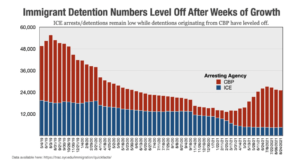The number of migrants being held in U.S. civil immigration detention centers has stabilized after many weeks of growth and remains well below pre-pandemic and Trump administration levels, according to researchers at Syracuse University.
“The most recent numbers show that about 25,000 people are in detention. The numbers are still not nearly as high as they were during the Trump administration, and prior to the pandemic when there were more than 55,000 people in detention on a single day,” the university said in a Sept. 7 news release about the data gathered by its Transactional Records Access Clearinghouse, or TRAC.
The statistics were released amid a flurry of other developments on the southern border and in ongoing immigration policy debates in Washington, D.C. — events that observers noted have been obscured by all the attention given the tragedies surrounding the Aug. 31 withdrawal from Afghanistan and the emergency resettlement of an estimated 60,000 Afghan allies in the U.S., and many more in other nations.
Apprehensions of migrants are leveling off under the Biden administration after a summer spike.
While the plight of Afghan refugees has generated a welcoming posture across American religious and political lines, other research shows the nation divided about immigrants and refugees from nations other than Afghanistan.
But TRAC figures show that apprehensions about migrants are leveling off under the Biden administration after a summer spike.
“The majority of people in detention were arrested by Customs and Border Patrol, the agency responsible for border enforcement, while far fewer people were arrested by Immigration and Customs Enforcement, the agency primarily responsible for interior enforcement,” the university said.
 The TRAC figures show total detentions reaching more than 55,000 in August 2019 and declining to the low 20,000s during the summer of 2020 — the same period when the Trump administration implemented policies to summarily return asylum seekers and other migrants to Mexico using COVID-19 prevention as a rationale.
The TRAC figures show total detentions reaching more than 55,000 in August 2019 and declining to the low 20,000s during the summer of 2020 — the same period when the Trump administration implemented policies to summarily return asylum seekers and other migrants to Mexico using COVID-19 prevention as a rationale.
Arrests hovered around 13,200 in March and April this year and rose back to the mid-20,000s through the summer, TRAC found.
“ICE arrests appear to be at one of the lowest points in a decade and have not seen a single point of increase since Biden took office,” according to the analysis of the figures. “Detentions that originated from Customs and Border Patrol arrests, however, are driving the overall numbers. The numbers appeared to peak in July at just over 27,000, then declined over the past several weeks to 25,162 on Aug. 24, 2021.”
TRAC also reported substantial growth in the federal government’s new Dedicated Docket system that allows asylum-seeking families to remain in the U.S. while their cases are heard, with the goal of decisions being rendered within 300 days.
“By the end of July 2021, just two months after the program started, nearly 5,000 people and about 1,700 families have been placed onto the immigration court’s new Dedicated Docket,” according to a summary of the TRAC numbers.
The analysis found that 150 cases on average are being added daily and that 41% of individual enrollees are from Ecuador, 12% are from Honduras and 10% are from Guatemala. Half the cases are in New York City, with other significant numbers in Newark, N.J.; Miami; and Los Angeles, according to TRAC.
“The most common type of family unit included one female parent and one or two young children,” the clearinghouse reported. “Of the adults on the Dedicated Docket, three quarters are between the ages of 21 and 34. The most common age was 26. Nearly two-thirds of adults are listed as female.” Most of the children are between 2 and 3 years old.
But with an immigration backlog of more than 1.3 million, some immigration advocates noted that the new system must be monitored.
“Other expedited dockets — often referred to as ‘rocket dockets’— have been implemented in past years, including during both the Obama and Trump administrations,” according to Justice for Immigrants, an initiative of the U.S. Conference of Catholic Bishops.
Under the Trump Administration’s accelerated docket program, 80% of cases resulted in in absentia removal orders.
“These efforts raised serious due process concerns and often proved detrimental to due process. For example, under the Trump Administration’s accelerated docket program, 80% of cases resulted in in absentia removal orders, meaning the families were not in court when a judge ordered them removed,” the organization said.
“The Biden administration has promised that the Dedicated Docket will not sacrifice due process for speedy adjudications. However, concerns remain that those enrolled … will not receive complete and just consideration of their cases, especially since legal representation is not guaranteed to those in immigration proceedings.”
Syracuse University immigration researcher Austin Kocher said time will tell if this approach will be more helpful than previous efforts.
“In the past, programs like the Dedicated Docket have done more to create confusion and shuffle cases around than to solve the underlying systemic programs faced by the court,” Kocher said in prepared remarks. “It remains to be seen whether the Biden administration will stick to this program and if the Dedicated Docket will have positive or negative effects on immigration judges’ workloads.”
As these developments come to light, Democrats in Congress are seeking to create a $3.5 trillion budget that would include provisions for immigration reform.

Ali Noorani
“Through budget reconciliation, Democrats seek to legalize Dreamers, farmworkers and Temporary Protected Status recipients,” Ali Noorani, president and CEO of the National Immigration Forum, said in a recent “Noorani’s Notes” column. “Migration from Central America continues even as Mexico, at our behest, hardens its southern border. Natural disasters and political instability in Haiti and Cuba, respectively, create their own set of migration pressures.”
And the pressure is on the White House and Congressional Democrats to get reforms through the budget reconciliation process, the forum explained separately.
“Following a federal court ruling that the Deferred Action for Childhood Arrivals policy is unlawful, Congress is facing growing urgency around finding a permanent solution for Dreamers, and — more generally — making overdue and needed reforms to the immigration system … . The plan will also likely include funding for border security, including $10 billion for infrastructure at ports of entry.”
Noorani noted the pressures around immigration are mounting even beyond Washington, D.C.
“All of this is happening against a backdrop of an increase in white extremism, a coronavirus pandemic that 43% of Republicans believe immigrants crossing the southern border are responsible for spreading (despite evidence to the contrary), and looming electoral cycles that will be the most divisive of our lifetime.”
Related articles:
As unaccompanied children surge across the border again, Baptist ministries retool
She’s pro-life and pro-immigrant and trying to bring other evangelical women along
Despite the challenges, Americans still favor immigration
Broad support for helping Afghan refugees does not uniformly extend to all refugees


